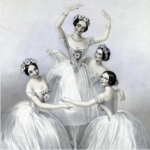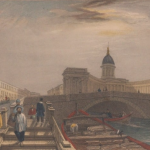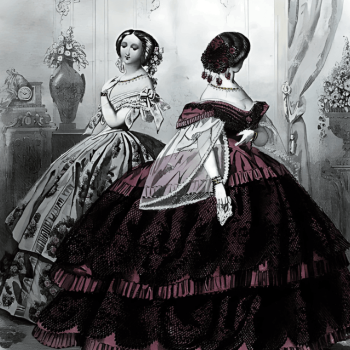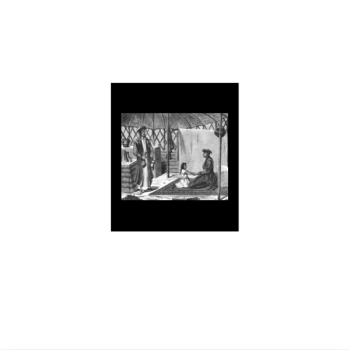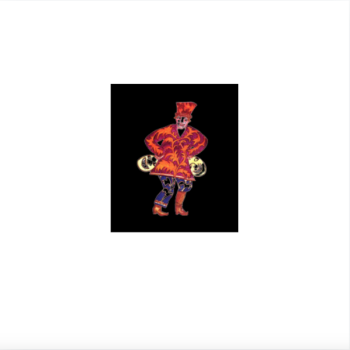ZENEIDA R-VA
At the end of 1837, Helena Andreevna returned to Colonel Pyotr Alekseevich. When she was healthy, Helena Andreevna would sit for hours at a time writing behind her green calico partition, which the children called “mother’s office.” Neither of the girls dared to touch anything in that corner, separated from their nursery by a single curtain. It was through her writing, and translations of works by Bulwer-Lytton, that Helena Andreevna earned money to pay the governesses and teachers. Many military officers often came to their home for lunch and tea, but Helena Andreevna did not like it when they started talking loudly, and puff whole clouds of smoke. She would invariably leave their company after dinner and lock herself in the nursery with her children. She had with her a nanny, a little old Ukrainian woman named Orina, but the work was still overwhelming. Not only was she herself very sick, so, too, was little Vera, who suffered from weak legs. Another trip to Pyatigorsk was certainly in order.
On New Year’s Eve her story “Utballa” was published under the pseudonym Zeneida R-Va. She carefully hid her name, not so much out of modesty, but rather fear of incurring even more indignation from provincial society. [1] It was the story of a woman, the titular Utballa, who was the result of an illicit union between a Russian landlord and a Kalmyk woman.[2] Remembering her time living with the Kalmyks, the story, besides raising the important social question about the position of an illegitimate child in society, “Utballa” was an excellent introduction to traditions, way of life, games, homes, amusements, and social structure of those people of the steppes.[3] She writes:
Sometimes the Kalmyk nomads approach the wide Volga. Coming out of the banks, the river, for most of the summer, becomes a sea, and cheerfully rolls its waves between green forests; thousands of ships glide along its surface; multi-colored flags are motley on the masts, the ringing voices of industrialists fill the banks with mournful melodies. Suddenly a yellow cloud floats to the horizon, expands and overtakes a typhoon. The Volga seethes, turning black; the whirlwind swirls the coastal sand, raising it up in columns. Merry songs turn into cries of fear, and often into mortal groans. Utballa always greeted these thunderstorms with wild joy; her chest breathed the furious air more freely, and her eyes greedily admired the menacing mutiny of the waves when they pressed and broke one another with jagged ridges. Her soul was torn to follow them: “Happy waves! You are rolling past cheerful cities and flowering villages! Waves, tell him that Utballa is here! That here she is waiting for him! That she has already gone wild, the salt has burned her skin, the wind has carried her roses across the desert, calluses cover her hands, but she still loves him! [But the waves rolled in the wrong direction, hurrying to the deserted sea, as a faithful friend hurries to an exile chained by evil fate in a foreign land.
Fate had taken pity on Helena Andreevna’s moral loneliness, and sent her a kind, self-sacrificing soul in the person of Antonia Christianovna Kulvein, the recent governess for a certain lady of Poltava “of easy virtue.”[4] She joined the Hahn household initially as a teacher but soon became Helena Andreevna’s best friend. The story of Antonia was one of tragedy and perseverance. The young woman, a native of Finland, became a rootless orphan as a child when she was betrayed by her evil stepmother. Thrown out of her house on a cold winter night, she nearly froze to death.[5] The Kister (Deacon) discovered her in an unconscious state on the steps of the Lutheran church where her grandfather was once a pastor. With his assistance, Antonia was enrolled as a candidate at Catherine the Great’s Novodevichy Institute. Like its sister school, The Smolny Institute, it was one of the first institutions for female education in Russia. It opened in January 1765 for poor and orphaned girls (many being daughters of retired soldiers.)[6] Antonia excelled in her studies and received a monetary prize from Tsar Nicholas Pavlovich himself when she graduated.[7] Her troubles were not over, however, for after leaving the institute she still had much to endure while living in other people’s houses. Just before meeting Helena Andreevna, Antonia lived as the governess in the home of a wealthy landowner who decided to “blame her erotic sins on a poor hired orphan.” She would help Helena Andreevna in everything, from caring for her during her frequent illnesses, copying her works, and categorically taking possession of the children, especially little Vera.[8] She did this all without accepting any payment.
“Let them pay me 1000 rubles per plowed tithe, and I will willingly begin to cultivate the land instead of my manuscripts!” Helena Andreevna said in response to those who frivolously condemned her for “wasting time for the sake of author’s vanity.” When she was advised to give up her studies to preserve her health, she resolutely declared: “No matter what sacrifices I make, I want my children to be well, but fundamentally well, and educated. And I have no means except my pen!”[9] If she could follow her own inspiration, she would throw her pen into an oven, but others did not allow her to do that. She was the soil which, although trampled underfoot, had been honored ever since gold ore was discovered in it. She wrote because it eased her soul; in the language of one of the heroines in her stories, through her writing, she could express everything that oppressed her; she could pour out her feelings, and sometimes tears, onto paper.[10] Her next piece, “Jellaledin,” was published in Paris that same year (1838,) and dealt with themes of doomed romance and sacrifice in the Russian frontier.[11] Meanwhile, in the capital cities, speculation arose as to who was hiding under the name “Zeneida R-Va.”
Helena Andreevna suffered still more this winter. Her doctor positively forbade her from spending so much time on her writing. On these occasions, she spent her evenings seated at the piano, while Antonia, as a joke, tried to teach Lelya how to dance. Vera thought this was funny, and also wanted to learn, but since her legs were still weak, she kept falling, down. This was a tragedy for the babe, of course, but a comedy for everyone else. Helena Andreevna and Antonia laughed until Vera cried. But Vera didn’t lose heart and decided to teach her old nanny Orina how to dance. The poor little Ukrainian could not turn her legs the way Vera ordered her. Being just a child, Vera lost her temper over this. “Nasty Orina’s legs are crooked!” she complained, pinching Orina’s legs.
When the weather was bad, the girls took their station near a window and happily gazed out at the great square where their father was directing military exercises with the several officers under his command. It was a joy to watch their father gallop on his fine horse, giving orders, with animated gestures. As was the sight of the soldiers maneuvering to the sound of drums and trumpets, and seeing the big guns hurried about on wheels which thundered as they moved.[12]
-
- NOVOROSSIYA
- The Arbiter Of Europe’s Destiny.
- The House Dolgorukuy
- Madame Krüdener
- Ekaterinoslav
- The Arabat Arrow
- The Mystery Of General Inzov
- The Doukhobors
- Pushkin
- Chuguev Military Settlement
- “The Blessed”
- The Decembrists
- Penza
- Independence
- Last Words Of Samuel Khristianovich Kontenius
- “Amid Coffins And Desolation”
- Rusalka
- Dead Souls
- Secret Passages
- Astrakhan
- Nevsky Prospekt
- Kalmyk Ulus
- Love And Ambition
- Duellistes
- Pyatigorsk
- A Heroine Of Our Time
- Winter Palace
- Zeneida R-Va
- Steppes
- Letter To Natalya
- Fire And Ice
SOURCES:
[1] “Bibliographic Materials For The Study Of The Life And Work Of E. A. Gan.” News Of The Department Of Russian Language And Literature Of The Imperial Academy Of Sciences. Vol. XIX, No. 2. St. Petrograd, Russia. (1914): 211-263.
[2] Hahn, Helena Andreyevna. The Complete Works Of Zeneida R-Va: Vol. I. N. O. Mertz. St. Petersburg, Russia. (1905): 63-137. (“Utballa.”)
[3] Nekrasova, E. S. “Helena Andreyevna Hahn (1814-1842): Part II.” Russkaia Starina. Vol. LI, No. 9 (September 1886): 553-574; Zhelikhovskaya, Vera Petrovna. “Helena Andreyevna Hahn (1835-1842.)” Russkaia Starina. Vol. LII, No. 3 (March 1887): 733-766.
[4] Zhelihovskaya, Vera Petrovna. How I Was Little. A. F. Devrien. St. Petersburg, Russia. (1898): 232-242.
[5] Speaking of her siblings, Vera Petrovna states that Antonia said: “[One] summer a terrible cholera came, and they died together with my stepmother.” [Zhelihovskaya, Vera Petrovna. How I Was Little. A. F. Devrien. St. Petersburg, Russia. (1898): 232-242.] This was presumably the cholera outbreak of 1830.
However, in a letter from Helena Andreevna to Natalya in January 1839, it would seem that Antonia’s stepmother was still alive. “Antoinette asks me to send you a letter to her step-mother, please deliver it to the address, just seal it and make it addressed.” [“Letter From E. A. Hahn To Natalya P. Dated January 10, 1839. [Kamenskoye Village, Ekaterinoslav Province.]” [Preparation of the text and comments by A.D. Tyurikov. Bahmut Roerich Center. Originally published in: Gershenzon, M.O. “Russian Woman Of The ‘30s.” Russian Thought. Vol. XII, C. 55 (December 1911.)]
[6] Dowler, Wayne. A History Of Education In Modern Russia: Aims, Ways, Outcomes. Bloomsbury Academic. London, England. (2022): 27.
[7] Zhelikhovskaya, Vera Petrovna. “Helena Andreyevna Hahn (1835-1842.)” Russkaia Starina. Vol. LII, No. 3 (March 1887): 733-766.
[8] Zhelihovskaya, Vera Petrovna. How I Was Little. A. F. Devrien. St. Petersburg, Russia. (1898): 232-242; “Bibliographic Materials For The Study Of The Life And Work Of E. A. Gan.” News Of The Department Of Russian Language And Literature Of The Imperial Academy Of Sciences. Vol. XIX, No. 2. St. Petrograd, Russia. (1914): 211-263.
[9] Zhelikhovskaya, Vera Petrovna. “Helena Andreyevna Hahn (1835-1842.)” Russkaia Starina. Vol. LII, No. 3 (March 1887): 733-766.
[10] [“Letter From E. A. Hahn To Natalya P. Dated January 10, 1839. [Kamenskoye Village, Ekaterinoslav Province.]” [Preparation of the text and comments by A.D. Tyurikov. Bahmut Roerich Center. Originally published in: Gershenzon, M.O. “Russian Woman Of The ‘30s.” Russian Thought. Vol. XII, C. 55 (December 1911.)]
[11] Hahn, Helena Andreyevna. The Complete Works Of Zeneida R-Va: Vol. I. N. O. Mertz. St. Petersburg, Russia. (1905): 138-209. (“Jellaledin.”)
[12] Zhelihovskaya, Vera Petrovna. How I Was Little. A. F. Devrien. St. Petersburg, Russia. (1898): 1-6.


